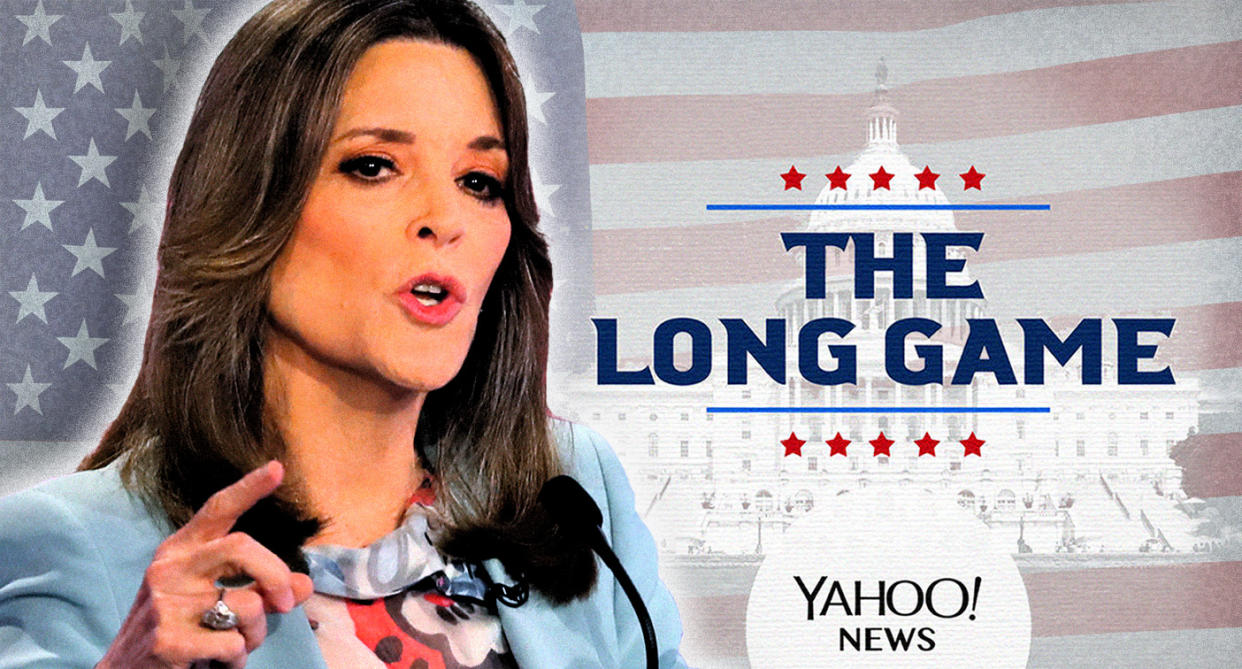David Brooks thinks Marianne Williamson is on to something

David Brooks writes in his new book about becoming “radicalized” over the past several years, coming to the belief that sweeping changes to the nation’s moral culture is needed to alter the country’s trajectory.
Brooks has also moved to the left on fiscal matters, but he believes two of the leading Democratic presidential candidates leading the charge for dramatic changes to the nation’s economic structures — Sen. Elizabeth Warren, D-Mass., and Sen. Bernie Sanders, I-Vt. — are not only mistaken, they’re looking in the wrong place for a powerful anti-Trump message.
“Trump is a moral threat to the country. He's about who we are, who we want to be, what moral climate do we want to raise our children in. He's not a policy revolutionary. He’s a cultural revolutionary,” Brooks said. “And I don't think you can answer to that with just plans, economic plans.”
Brooks, in an interview on “The Long Game,” a Yahoo News podcast, pointed to one of the more marginal and unconventional presidential candidates as the only person responding to Trumpism with a counter message that he feels hits the mark.
“I mean, Marianne Williamson is weird in all sorts of ways, but she's got this right: that you have to respond with a moral upsurge, or just decency,” Brooks said. “You don't have to be super-moral, just be decent and make a case for decency. And to me that's a unifying case and a very clearly majority case and it understands what this election is really about.”
Williamson, a 67-year-old New Age and self-help author, is a decidedly offbeat figure and holds few conventional qualifications to run for political office, much less president. But in the second Democratic debate in Detroit, Williamson again drew attention in large part because her language was so different from the rest of the field.
And this was intentionally and self-consciously so.
“If you think any of this wonkiness is going to deal with this dark psychic force of the collectivized hatred that this president is bringing up in this country, then I’m afraid that the Democrats are going to see some very dark days,” she said while talking about the water crisis in Flint, Mich.
She referred to emotional and psychological scars inflicted on the nation’s psyche by its racial history multiple times, and her closing statement doubled down on this theme, connecting the nation’s need for healing and repentance to its role in the world, where she said America has “sacrificed our moral leadership.”
“And until the Democratic Party is ready to speak to the deeper corruption, knowing that we ourselves sometimes because of our own corporate donations have participated [in this system], then I'm afraid those who vote for Trump will continue to vote for Trump and those who might not like Donald Trump will continue to stay home. I want a politics that goes much deeper. I want a politics that speaks to the heart,” she said.
Brooks said that Sen. Cory Booker, D-N.J., is one of the more serious candidates who “has the language” that approaches what Williamson is talking about but is trying to balance it with a conventional political approach of criticizing his foes.
“He emphasized at the beginning of the campaign he was going to campaign on love against hate,” Brooks said. “I think the rigors of the campaign and just the pressure to get on TV and to make a mark have dragged him away from love toward ‘I'm just going to be another person attacking.’”
Brooks said the bigger problem for any Democrat is that the party “was founded to battle material want … as a secular party.”
The Democratic Party “has more trouble talking the language of virtue and morality than the Republican Party does, for all its flaws,” Brooks said. “And so finding a Democrat who can talk in these terms, you have to — a bit — go against the tradition and culture of your own party. And Jimmy Carter did it, and Obama did it, and so I think it's very possible to do but it goes against sort of the materialistic bent of the party.”
Brooks’ new book, “The Second Mountain,” is about his own time in the wilderness as he went through a divorce and realized that he had lived a relatively self-oriented and uncommitted life, climbing the first mountain of ego-driven achievement. The title of the book refers to his realization that real fulfillment would come from feeding his soul on a second mountain, by devoting his life to things bigger than himself: vocation, faith and philosophy, community, and marriage once again. Brooks remarried in 2017.
“I no longer believe that the cultural and moral structures of our society are fine, and all we have to do is fix ourselves individually. Over the past few years, as a realist of personal, national and global events, I have become radicalized,” he writes. “I now think the rampant individualism of our current culture is a catastrophe. The emphasis on self — individual success, self-fulfillment, individual freedom, self-actualization — is a catastrophe. I now think that living a good life requires a much vaster transformation.”
The failures of hyperindividualism, Brooks writes, will drive people toward tribalism or its opposite: collectivism, or to what Brooks calls relationalism, which is his middle ground between the two — a commitment to others and to higher causes before self, but not a solidarity enforced from a central government.
If tribalism wins, Brooks writes, “the twenty-first century will be a time of conflict and violence that will make the twentieth look like child’s play.”
_____
Download the Yahoo News app to customize your experience.
Read more from Yahoo News:




